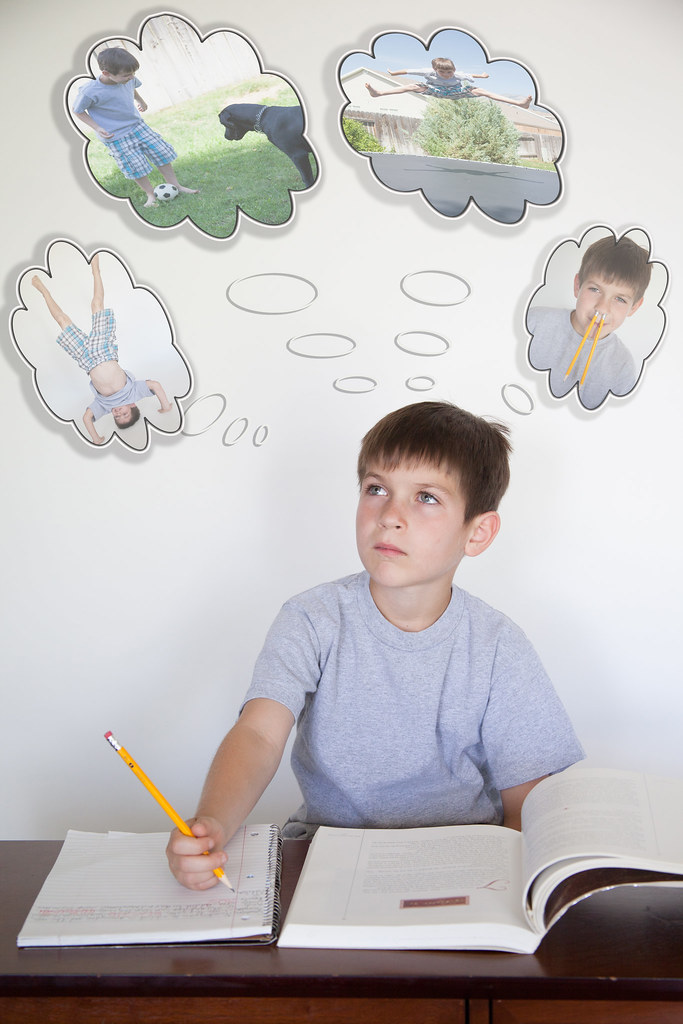
ADHD
- Easily distracted by extraneous stimuli
- Often does not follow through on instructions
- Often interrupts/intrudes
- Often engages in activities without considering possible consequences
- Often has difficulty organizing tasks & activities
- No impulse controls
- Might act hyperactive (constantly active and sometimes disruptive behavior )
- Emotionally volatile, often exhibit wide mood swings
- Depression/ anxiety develops, often in teen years
- Over/under-responsive to stimuli
- Difficulty initiating, following through
- Manage time poorly/lack of comprehension of time
- Often blames others for his or her mistakes
Stimulant Medications and the "ADHD Brain"
I've always wondered why giving a kid with ADHD the equivalent of speed seems to calm them down when it makes everyone else so hyper. Katharine explains it in terms I think I understand.
ADHD increases a person's impulsivity and causes them to hyperfocus on everything. Our frontal lobe normally is supposed to be saying, "Stop that!" It controls our actions. When we take speed it speeds up the frontal lobe so that it catches up to the "ADHD brain" and can think before it acts!
Meds aren't slowing kids with ADHD down.
They're speeding up the rest of the brain.
Stimulant ADHD Medication vs Non-Stimulants
Unfortunately, my children can't take stimulant medications because they cause major side-effects. Both my children have bipolar disorder and stimulant medications can trigger mania. My personal opinion is that non-stimulant ADHD meds don't work as well but they're better than nothing.
 Non-Medication Treatment
Non-Medication TreatmentKatharine Leslie {one of my favorite attachment "gurus"} quoted a study about children with ADHD. (Unfortunately, I didn't write down the study details, but this post has some information about ADHD, Medication, and Exercise).
Katharine said that the study took a group of children with ADHD, half of whom were on Ritalin and the other half of the group did 20 or 30 minutes (I don't remember which) of exercise every morning that "bounced" their brains in an up and down manner (like jogging or trampolines). {<-- blame="" btw="" do="" for="" horribly="" i="" inaccurate="" is="" it="" katharine="" my="" nbsp="" not="" recitation="" this="">please!}.
Both sets of children were sent to school and the teachers could not tell the difference!
The exercise lasts a little less time than the medicine, but how great for Bear, for whom ADHD meds cause too many side effects for him to use?! The problem would be getting him up 30 minutes earlier for school. It would have to be on the treadmill too since he can't be trusted outside.
Some exercise ideas:
- Mini tramp
- Jogging/ Treadmill
- Jump Rope
- Jumping Jacks
- Brain Gym
Medication
Many of our children's major issues cannot be "fixed" by medication (C-PTSD, RAD...), and are trauma-based, not biologically-based. So why give them medication?
Alleviating Symptoms
I know a lot of times there is huge resistance to giving children meds, and while I agree that there are times some children are over-medicated (particularly those in foster care), I believe that it often means kids with trauma issues are struggling more than most.
Children can't heal if they feel they are living in a war zone or they are struggling with basic coping skills, unable to function.
In my opinion, you can't work on healing trauma if you can't sleep, focus, sit still, react normally to external stimuli (like someone saying, "you dropped jelly on the counter," which, in my opinion, should not trigger a screaming rage but has)... Handling Dysregulation/ Meltdowns
There's a reason doctors prescribe pain medications after major injuries - it's because people heal faster when they are not in pain.
ADHD and Sleep
ADHD is linked with a variety of sleep problems. For example, one recent study found that children with ADHD had higher rates of daytime sleepiness than children without ADHD. Another study found that 50% of children with ADHD had signs of sleep disordered breathing, compared to only 22% of children without ADHD. Research also suggests that restless legs syndrome and periodic leg movement syndrome are also common in children with ADHD.In general, sleep deprivation is a problem among children in America. According to NSF's 2004 Sleep in America poll, more than two-thirds of children experience one or more sleep problems at least a few nights a week. For children with ADHD, poor sleep (too little sleep or symptoms of sleep disorders) may profoundly impact ADHD symptoms. In fact, one study found that treating sleep problems may be enough to eliminate attention and hyperactivity issues for some children.Children and adults behave differently as a result of sleepiness. Adults usually become sluggish when tired while children tend to overcompensate and speed up. For this reason, sleep deprivation is sometimes confused with ADHD in children. Children may also be moody, emotionally explosive, and/or aggressive as a result of sleepiness. In a study involving 2,463 children aged 6-15, children with sleep problems were more likely to be inattentive, hyperactive, impulsive, and display oppositional behaviors.

2 comments:
Makes sense!
Mini-tramps! Wal-mart, about $30. I use them with my RAD kids.
I don't know as they do any good, but I know I have heard they are supposed to. (And it sounds like this concurs.)
Post a Comment